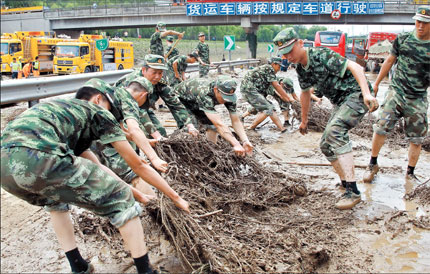Beijing storm highlights risks for China's cities
 0 Comment(s)
0 Comment(s) Print
Print E-mail Xinhua, July 23, 2012
E-mail Xinhua, July 23, 2012
A fierce rainstorm that claimed 37 lives over the weekend in Beijing has raised questions about the capital's ability to cope with flooding.
Many roads in the city were submerged under waist-deep water for hours on Saturday during the downpour, the heaviest the city has seen in 60 years.
The municipal government said as of Sunday night, 25 people had drowned, six died in house cave-ins, five were electrocuted to death and one was killed by lightening.
The rain and flooding also caused blackouts and traffic paralyses. As of Monday, the Beijing-Hongkong-Macao expressway had still not reopened as part of it remained submerged.
The disaster affected 1.9 million people and caused nearly 10 billion yuan (about 1.6 billion US dollars) of damage, while the exact economic loss is still being verified by local governmental departments, according to Beijing flood control and drought relief headquarters.
Many people have taken to Sina Weibo, a popular micro-blogging site, blaming government officials for the city's poor drainage systems.
"The situation of the sewers reflects the real quality of the city's infrastructure," posted "Brother Zhang Xiaohua."
"Musibo" wrote, "China has been investing heavily in construction in recent years, and the glossy appearance of the cities is eye-catching. However, the huge loss from the rainstorm in Beijing has exposed the flaws of the city's infrastructure, which should raise an alarm for the policy makers."
Urban planning flaws
Urban flooding has been a chronic problem in China. During this summer, rainstorms and flooding have wreaked havoc in many cities including the metropolises of Shanghai, Guangzhou, Chongqing and Shenzhen.
Experts believe the floods are largely the result of urbanization, with vast networks of roads and the elimination of greenbelts decreasing some cities' ability to cope with heavy rain.
Wang Hao, expert with China Institute of Water Resources and Hydropower Research, said, more than 80 percent of Beijing's roads are covered in impermeable materials such as concrete and asphalt, which obstructs the infiltration of the rainwater.
However, an investigation led by Li Haiyan, a professor of Beijing University of Civil Engineering and Architecture, said that about half of the drainage networks in Beijing are filled with sediments as thick as 10 to 50 percent of the pipes' diameter.
Sheng Minzhi, an engineer at the Hangzhou Planning Bureau, said the mass construction of tall buildings and underground parking lots in some Chinese cities has also slowed the rate at which rainwater is absorbed into the ground.
Wang Yi, official with Beijing flood control and drought relief headquarters, said, the drainage systems of Beijing's downtown area are largely built to withstand rainfall of 36 to 45 millimeters per hour.
Only a few places, such as the Tiananmen Square, have a drainage system that can withstand 56 millimeter per hour of rainfall.
Xu Chenghua, an engineer at the Hangzhou Urban Planning Academy, said storm drainage systems in Chinese cities are supposed to be designed in accordance with the Urban Drainage Engineering Planning Regulations approved by the Ministry of Housing and Urban-Rural Development in 2000.
Wang Zhansheng, an environmental and engineering professor at Tsinghua University, said the flooding would not be so severe if the drainage systems were designed to handle more severe rainfalls, adding that the flooding could be avoided if the regulations took population growth, water usage and sewage treatment into consideration.
A central government group responsible for drafting regulations related to urban drainage engineering gathered on May 18 to discuss urban flooding. A source with the group said new regulations concerning drainage system designs are expected to be launched in 2013.
However, experts noted that the reconstruction of the drainage systems is a very expensive and difficult project.
Wang Hao said that since the lay-out and the functional structure of the cities are already in shape, to renew the drainage systems to the level of that of developed countries will be a huge cost.
Experts suggested that the central government launch an uniform urban flooding drainage standard to guide the urban planning of Chinese cities.






